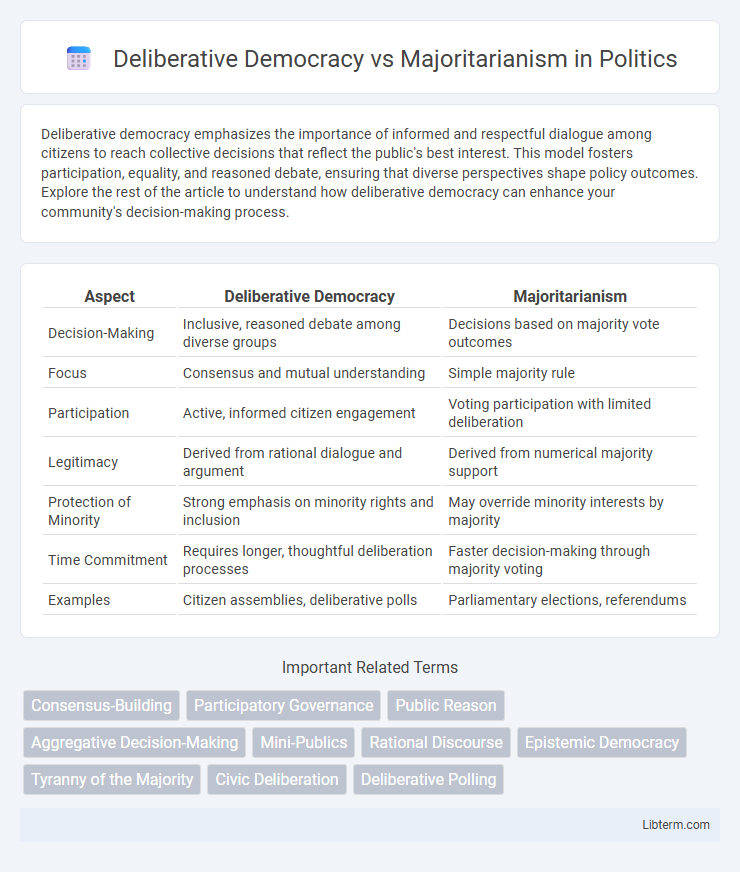Deliberative democracy emphasizes the importance of informed and respectful dialogue among citizens to reach collective decisions that reflect the public's best interest. This model fosters participation, equality, and reasoned debate, ensuring that diverse perspectives shape policy outcomes. Explore the rest of the article to understand how deliberative democracy can enhance your community's decision-making process.
Table of Comparison
| Aspect | Deliberative Democracy | Majoritarianism |
|---|---|---|
| Decision-Making | Inclusive, reasoned debate among diverse groups | Decisions based on majority vote outcomes |
| Focus | Consensus and mutual understanding | Simple majority rule |
| Participation | Active, informed citizen engagement | Voting participation with limited deliberation |
| Legitimacy | Derived from rational dialogue and argument | Derived from numerical majority support |
| Protection of Minority | Strong emphasis on minority rights and inclusion | May override minority interests by majority |
| Time Commitment | Requires longer, thoughtful deliberation processes | Faster decision-making through majority voting |
| Examples | Citizen assemblies, deliberative polls | Parliamentary elections, referendums |
Understanding Deliberative Democracy
Deliberative democracy emphasizes reasoned discussion and inclusive dialogue among diverse participants to reach consensus or well-considered decisions, contrasting with majoritarianism's reliance on simple majority rule without necessarily engaging minority perspectives. It values deliberation quality, transparency, and mutual respect to enhance legitimacy and informed decision-making. This model aims to address the limitations of majoritarianism by fostering deeper public engagement and collective problem-solving.
Majoritarianism: Definition and Key Features
Majoritarianism is a political philosophy where decisions are made based on the preferences of the majority of the population, often through voting systems that emphasize majority rule. Key features include a clear emphasis on the will of the majority, a tendency to prioritize majority interests over minority rights, and the use of electoral mechanisms like first-past-the-post or plurality voting. This approach supports decisive governance but may risk marginalizing minority groups and undermining pluralistic discourse.
Core Principles: Consultation vs. Majority Rule
Deliberative democracy emphasizes inclusive consultation where diverse perspectives are actively engaged to reach reasoned consensus, promoting informed and reflective decision-making. Majoritarianism prioritizes the principle of majority rule, where decisions are determined by the preferences of more than half the electorate, often sidelining minority viewpoints. The core distinction lies in deliberative democracy's focus on dialogue and mutual understanding versus majoritarianism's emphasis on numerical dominance in political outcomes.
Historical Development of Both Systems
Deliberative democracy emerged from Enlightenment ideals advocating reasoned debate and inclusive participation, evolving through 20th-century political theory as a response to the limitations of majoritarianism. Majoritarianism traces its roots to classical democratic principles emphasizing majority rule as a foundational mechanism, gaining prominence in early democratic states such as ancient Athens and the development of constitutional democracies in the 18th century. The historical development of both systems highlights a shift from simple majority decision-making toward more complex models valuing dialogue, consensus, and minority rights within democratic governance.
Decision-Making Processes Compared
Deliberative democracy emphasizes inclusive, reasoned discussion, allowing diverse perspectives to shape decisions through dialogue and reflection. Majoritarianism relies on direct voting where the majority's preference dictates outcomes, often sidelining minority views. Decision-making in deliberative democracy seeks consensus and legitimacy through participation, whereas majoritarianism prioritizes efficiency and simplicity by adhering to majority rule.
Inclusivity and Minority Rights
Deliberative democracy emphasizes inclusivity by engaging diverse voices and fostering reasoned dialogue to protect minority rights from being overridden by majority preferences. In contrast, majoritarianism prioritizes majority rule, often risking the marginalization of minority groups due to its focus on majority preferences without guaranteed mechanisms for minority protection. Ensuring minority rights in deliberative democracy enhances social cohesion and equitable policy outcomes by integrating varied perspectives into the decision-making process.
Practical Examples in Global Politics
Deliberative democracy emphasizes inclusive, reasoned debate among citizens before decisions are made, as seen in Iceland's Constitutional Council where citizens participate directly in drafting reforms. Majoritarianism prioritizes the majority's will, exemplified by the UK's first-past-the-post electoral system that often sidelines minority voices. These practical models highlight the trade-offs between consensus-building through deliberation and efficiency via majority rule in global politics.
Strengths and Limitations of Deliberative Democracy
Deliberative democracy emphasizes inclusive dialogue and reasoned debate, fostering well-informed decision-making by encouraging diverse perspectives and promoting legitimacy through participant engagement. Its strengths include enhanced citizen empowerment, deeper understanding of issues, and increased public trust due to transparent deliberation processes. However, limitations arise from potential time-consuming discussions, unequal participation risks, and difficulties in reaching consensus in large, heterogeneous populations.
Critiques and Challenges Facing Majoritarianism
Majoritarianism faces critiques for its tendency to marginalize minority voices and reduce complex political issues to a simple numerical majority, often leading to the "tyranny of the majority." This approach frequently overlooks the importance of inclusive dialogue and consensus-building, which deliberative democracy emphasizes to enhance legitimacy and fairness. Challenges include fostering broad public participation and balancing efficient decision-making with the protection of diverse interests and rights.
Future Prospects and Reforms in Democratic Governance
Future prospects for deliberative democracy include enhancing citizen engagement through digital platforms and institutionalizing participatory mechanisms that ensure inclusive dialogue and informed decision-making. Majoritarianism may undergo reforms to balance majority rule with minority rights, integrating deliberative processes to foster legitimacy and reduce polarization. Democratic governance increasingly prioritizes hybrid models combining deliberation and electoral accountability to address complex societal challenges and sustain democratic resilience.
Deliberative Democracy Infographic

 libterm.com
libterm.com